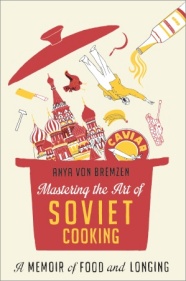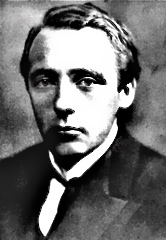I am pleased to announce the initial publication my translation of the 20th century Russian classic, The Master and Margarita, by Mikhail Bulgakov. Translating this novel from Russian to English has been a joy and an obsession; I finally feel that it is translated, edited, proofed and formatted to my satisfaction, and so ready to go out into the world. Currently it is only available as a Kindle e-book, but is days away from release as a trade-paperback. It will also soon be available on Apple’s iBooks store and at Barnes & Noble. Continue reading “Just Published: New Translation of ‘The Master and Margarita’ by Mikhail Bulgakov”
Tag: Russian society
The things that make Russians uniquely Russian.
Dreams, Dreams, Dreams
With two dreams, one after another in Master and Margarita, Bulgakov touches on some risky subjects.
As mentioned at the beginning of my last post (“Sympathy for the Devil in Russian Literature”), my efforts to translate Chapter XV of Master and Margarita, “Nikanor Ivanovich’s Dream,” led me to become fascinated with the use of dreams as a device in Russian novels. My first avenue for delving into this topic further was Dostoevsky’s use of it in The Brother’s Karamazov, specifically the chapter titled, “The Devil. Ivan’s Nightmare.” This provided not only another example of a dream sequence, but also another depiction of the devil, so I devoted that last post to a comparison of Dostoevsky’s devil with Bulgakov’s.

I remained intrigued, however, by the dream thing. As I began translating the next chapter of Master and Margarita, “The Execution,” I was delighted to find that I was dealing here with yet another dream—this one dreamt by Ivan (Bulgakov’s Ivan, not Dostoevsky’s); two dreams in a row! Continue reading “Dreams, Dreams, Dreams”
Praise for Alina Simone’s Views on Russian/American Cultural Differences
On Alina Simone’s New York Times op-ed piece about the cultural disconnect triggered by the seemingly, to an American, polite question, “How are you?”.
I just had the pleasure of reading a piece on The New York Times website entitled, The ‘How Are You?’ Culture Clash, by Alina Simone. In this article, Ms. Simone—born in Ukraine to Russian parents, but raised in the U.S.—speaks to how the common question often asked, even of strangers, by the average American, “How are you?” can highlight differences in cultural outlook when asked of someone raised in the Soviet Union or some its successor states. She brings to this discussion a perspective from both sides of this cultural gap, as someone often faced with the task of smoothing over, as she puts it, “the bafflement of my American friends and the hurt feelings of my Russian expat family as a result of this innocuous inquiry.”
I appreciate her insights for what they say about not only culture, but also about language: how it used, how it is informed by, and informs, the outlook shard by the people who grew up using it, and how it can spotlight differences in outlooks among societies. I am also impressed by Alina Simone’s combining of personal experience with the views of others and with her scholarly research. She compares the inane formality of the knee-jerk American response, “fine,” with the equally disturbing tendency of Russians to give an honest answer, full of intimate details to explain why they are doing how they are doing. Continue reading “Praise for Alina Simone’s Views on Russian/American Cultural Differences”
Russian Service Industry: Better? Or Just (Better) Paid?
 Aeroflot highlights efforts of the Russian service industry to improve customer service. Is paying people to smile, speak softly and kneel a good thing?
Aeroflot highlights efforts of the Russian service industry to improve customer service. Is paying people to smile, speak softly and kneel a good thing?
An article appeared yesterday (Saturday, Nov. 2, 2013) in the The New York Times reporting on Aeroflot’s successful efforts to improve service on its flights—‘Russian Service, and With Please and Thank You.’ Reporter Andrew E. Kramer sees the extensive training now given to flight attendants for the Russian airline as part of a “broad and transformative trend in the Russian service industry brought about by the rising demands of middle-class consumers.” On its way out, apparently, is the stereotypical gruff and taciturn response of the Russian service worker who has to actually provide a service. Is this a good thing? I wonder. Continue reading “Russian Service Industry: Better? Or Just (Better) Paid?”
Where Were You On 19 August 1991?
History in Literature: The coup attempt in the Soviet Union of 19 August 1991 as viewed from the hinterlands.

I love reading good literature that gives a view of great historical moments from the perspective of ordinary people. At the beginning of Andrei Dmitriev‘s novel The Peasant and the Teenager (Крестьянин и Тинейджер) there is depicted, through the memories of a man in rural Russia, presumably the “peasant,” an event recent enough to be a part of my own consciousness–the coup attempt of August 1991 that sought to reestablish centralized Communist Party rule in the Soviet Union, in reaction to the reforms of Mikhail Gorbachev.
The decline of Soviet economic and social life leading up to 1991 is highlighted in the reminiscences of Panyukov, the first character introduced in The Peasant and the Teenager, as he reflects on the life he shared with his childhood friend, Vova, after both had served with the Red Army in Afghanistan. Continue reading “Where Were You On 19 August 1991?”
“Mastering the Art of Soviet Cooking—” Portraits of Life in the USSR, with Recipes!
Review—Mastering the Art of Soviet Cooking: A Memoir of Food and Longing, by Anya von Bremzen
Crown, 2013
On sale—September 17, 2013 
One could be excused for imagining that a book with the title Mastering the Art of Soviet Cooking might be a collection of recipes, with details about the finer points of food preparation in the former Soviet Union. The subtitle, “A Memoir of Food and Longing,” hints at a more personal account. Neither of these, however, prepare the reader for the epic of family history, biography, autobiography and scholarly assessment of the Soviet Union presented in this excellent new book by Anya von Bremzen, former citizen of the USSR and three-time James Beard Award winner. While this may seem like too much for a single volume, it is artfully stitched together using food, in all its meanings, as thread. The tale of the creation and eventual dissolution of the Union of Soviet Socialist Republics is one of, if not the grandest narrative of the 20th century. Anya’s stories of herself, her grandmother, and especially her mother, are engaging and endearing, and breathe life into the stock of familiar characters and events in the history of the USSR. Her well-crafted distillations of the theses and arguments of prominent academics on subjects such as the “nationalities question” and Stalinist totalitarianism are usually spot-on. All this is brought together by how it informs, and is informed by, food.
Any illusions that this is a book celebrating the quality of Soviet cuisine are quickly put aside when the author admits, in mentioning her mother’s love for sosiski, i.e.- Soviet hotdogs, that “besides sosiski with canned peas and kotleti (minced meat patties) with kasha, cabbage-intensive soups, mayo-laden salads, and watery fruit kompot for desert—there wasn’t all that much to eat in the Land of the Soviets.” Continue reading ““Mastering the Art of Soviet Cooking—” Portraits of Life in the USSR, with Recipes!”
Panyukov’s Televisions
Andrey Dmitriev’s character, Panyukov, marks time according to the life-cycle of his televisions

I have shifted back into translating prose for the time being. The poetry break was nice, but I want to try to actually finish a novel at some point. One of the attractive things about translating a poem, excepting epics like Pushkin’s Evgenii Onegin, is that it can be started and finished in a few days, maybe even just one. A novel, on the other hand, is a long term project.
I will present here another passage from The Peasant and the Teenager (Крестьянин и Тинейджер), by Andrey Dmitriev. As mentioned in an earlier post, this novel begins with the introduction of Panyukov, a man living in a village in rural Russia. Panyukov’s character is initially described through his own reflections on his past, on the “best of times” he had enjoyed when his friend Vova still lived across the road and they worked together raising livestock and growing food in their private gardens and greenhouse. The excerpt below hints that the passage of time for Russians living in farm country could be marked by the life-cycle of televisions. It is funny, poignant and sad in a way that only the relatively minor misfortunes of others can be. Continue reading “Panyukov’s Televisions”
Velimir Khlebnikov’s ‘Don’t Be Bad!’
Khlebnikov’s century-old poem resonates with the Russia of today.
I do love translating poetry, agonizing as it can be sometimes (see previous post- It Has to Be “Love”). My latest effort puts into English a poem written by one of the founders, and leading lights, of the Russian ‘Futurist’ movement, Velimir Khlebnikov (Viktor Vladimirovich; “Velimir” was his pen name). Below is my translation of Не Шалить (pron.-Ne Shalit’!= Don’t Be Bad!), followed by a discussion of Khlebnikov, the futurists and the resonance of this poem with Russian society today.
Don’t Be Bad!
Hey, cut-throat racketeers,
Heads full of sludge!
In old Cossack leathers
Through Moscow I trudge!
Not for its grandeurs
Is truth on our side,
So that in rich furs
We may haughtily ride.
Not in that strife
Did blood flow without check,
So that each merchant’s wife
Could wear pearls round her neck.
It’s no good to rail
All the night long
I will sing, I will sail
The Volga, the Don!
I will go tonight
Ahead where fate tends
Who’s with me in flight?
There are with me–my friends
February 1922
Velimir Khlebhikov
Continue reading “Velimir Khlebnikov’s ‘Don’t Be Bad!’”
‘Крестьянин и тинейджер’

Andrei Viktorovich Dmitriev’s Крестьянин и тинейджер-The Peasant and the Teenager: A view of Russia in its last decade as a Republic of the U.S.S.R.
Recently I have been engaged in translating and studying certain novels that have won the Russian Booker Prize, an award presented yearly since 1992 to honor outstanding Russian fiction . With this exercise I seek to gain a broader understanding of contemporary Russian thought and culture. My primary interest is in how Russians today view their own history, especially that of the Revolution of 1917 and the Soviet period.
The two works I’ve looked at most recently serve to bookend this period: Казус Кукоцкого (Kazus Kukotskovo = ‘The Extraordinary Case of Kukotsky’), by Lyudmila Evgenyevna Ulitskaya, and Крестьянин и Тинейджер (Krest’yanin i Tinyedzhyer = ‘The Peasant and the Teenager’), by Andrei Viktorivich Dmitriev. In a recent post (‘Казус Кукоцкого’) I examined Ulitskaya’s novel as to how it portrays the Revolution and its aftermath, finding her views consistent with my own narrative of this period. Turning to Dmitriev’s ‘The Peasant and the Teenager,’ I was delighted to find not only a portrayal of Russia in the decisive last decade of the U.S.S.R., but one from the perspective of rural, ‘collective farm’ Russia. Continue reading “‘Крестьянин и тинейджер’”


